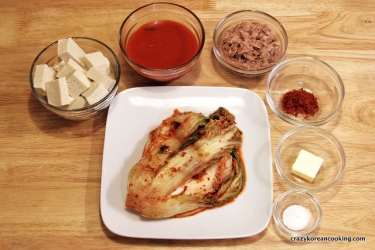Kimchi Stew with Tuna, Quick and Easy Kimchi-jjigae
참치 김치찌개
This is a quick and easy way to make Kimchi Stew with a can of tuna. See traditional or classic Kimchi Stew recipe here.
Kimchi Stew is one of the most loved dishes in Korea. No appetite? This is sure to fix it. Anyone can finish a big bowl of rice with Kimchi Stew! As long as you have nicely fermented kimchi, you can't go wrong with this one.
Stews are supposed to be a salty dish you eat little by little with rice. It's usually placed in the middle of the table and shared with a few people. Soups are more of an individual dish that is less salty, usually larger in quantity, and served in individual bowls.
Buy Korean ingredients online here.
This is a quick and easy way to make Kimchi Stew with a can of tuna. See traditional or classic Kimchi Stew recipe here.
Kimchi Stew is one of the most loved dishes in Korea. No appetite? This is sure to fix it. Anyone can finish a big bowl of rice with Kimchi Stew! As long as you have nicely fermented kimchi, you can't go wrong with this one.
Stews are supposed to be a salty dish you eat little by little with rice. It's usually placed in the middle of the table and shared with a few people. Soups are more of an individual dish that is less salty, usually larger in quantity, and served in individual bowls.
Buy Korean ingredients online here.
INGREDIENTS
shop these ingredients online »| 350 g | Kimchi 김치 | |
| 1 | Canned Tuna 참치 통조림 | |
| 15 ml | Butter 버터 | |
| 600 ml | Water 물 | |
| 120 ml | Kimchi Juice 김치국물 | |
| 15 ml | Gochugaru, Korean Hot Pepper Flakes 고춧가루 | |
| 225 g | Tofu, Soft or regular (for stew) 두부 (찌개용) | |
| 5 ml | Salt 소금 | |
| 5 ml | Chopped Green Onion 다진파 (optional garnish) |

Good to Know:
Kimchi
For good kimchi jjigae, you need over fermented (sour) kimchi. If your kimchi is not fermented enough, you can add 1 tablespoon of vinegar to add some extra sour taste.
For 2 servings, one quarter of a whole napa cabbage kimchi is used, which is equivalent to 2 cups of cut kimchi (2 inch pieces) or about 350 g in weight.
Tofu
For 2 servings, ½ block of tofu is used. One block of tofu generally weighs 400-500g although it varies depending on the brand. You can always add more tofu if you like.
Adding kimchi juice and seasoning
If you add a good amount of kimchi juice, it will taste much better although it could get spicy. Remember the more kimchi juice you add, the less salt you will need. So, taste as you season.
Variations
Traditionally, Kimchi Stews are made with pork but this is also a good variation if you like fish. Also, you can make it really quick and easy. See traditional or classic Kimchi Stew recipe here.
Optional Ingredients and Substitutions
Gochugaru, Red Chili Flakes: This is optional if your tolerance to spiciness is low. Add gochugaru if you don't have any kimchi juice to add or if you like your stew extra spicy.
Butter: You can omit this although butter adds richness to the soup. You may be wondering why butter is used in a Korean stew. Butter is not a traditional Korean ingredient but it is widely used in Korea today especially in Kimchi fried rice and other stir-fries.
Tofu: You don't have to use tofu.
More questions? Please leave your questions below in the comments section. We will do our best to answer as soon as we can.
instructions |
photos |
summary |
|---|---|---|
Ingredient amounts in the recipe instructions are for the default serving size. |
Click to enlarge photos. |
Ingredient amounts in the recipe summary are for the default serving size. |
1. Saute canned tunaIn a pot, sauté 1 can of tuna (you can add another can if you love tuna) with 1 tablespoon of butter on high heat. Stir constantly. |
1
Saute
Stir constantly High Heat
| |
2. Saute KimchiCut kimchi into about 2 inches long and add to the pot with tuna. Saute for another 7 minutes. *If it starts to stick to the bottom, add a little bit of kimchi juice or water. |
2
Cut
Saute High Heat
| |
3. Add water and boilAdd 2½ cups of water and ½ cup of kimchi juice (optional). Add 1 tablespoon of red chili flakes (optional) to make it spicier and more red in color. Bring to boil and boil for another 10-15 minutes on medium heat. Season with salt (Add gradually as you taste it). The amount of salt will vary depending on the type of kimchi and how much kimchi juice you used. Usually Korean stews are a little saltier than regular soups because it’s meant to be eaten in small amounts with rice. |
3
Add
Add
Bring to boil Boil Med Heat
Season with salt | |
4. Add tofu (optional)(optional) You can add tofu and boil for another 2 minutes. |
4
Add tofu (optional) Boil High Heat | |
5. ServeServe in a big bowl. You can also use ddukbaegi or stone bowl with a bowl of rice on the side. You can add chopped green onions on top as a garnish. |
5
Serve Garnish with green onions (optional) |













 2 min
2 min
Comments